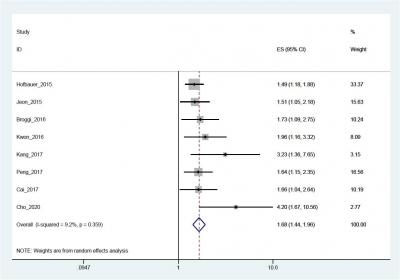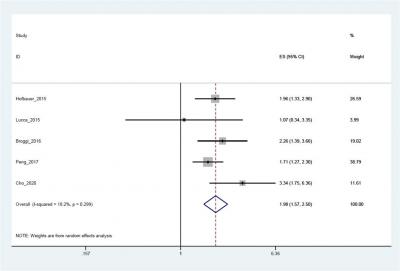|
Cancer - Kidney(구연)
|
(E-076)
|
|
|
신세포암에서 예후인자로서의 Prognostic Nutritional Index의 가치: 체계적 고찰 및 메타분석 |
| 아주대학교 의과대학 비뇨기과학교실¹,대진의료재단 분당제생병원² |
| 김선일¹,김세중¹,조대성² |
Objective: To perform a systematic review and meta-analysis of the Prognostic Nutritional Index (PNI) as a prognostic factor for renal cell carcinoma (RCC).
Methods: Eligible studies that evaluated the prognostic impact of pretreatment PNI in RCC patients were identified by comprehensive searching. The end points were overall/cancer-specific survival (OS/CSS) and recurrence-free/disease-free survival (RFS/DFS).
Results: In total, nine retrospective, observational, case-control studies involving 5,976 patients were included for final analysis. Eight studies evaluated OS/CSS, and 5 evaluated RFS/DFS. Our results showed that lower PNI was significantly associated with unfavorable OS/CSS (HR=1.68, 95% CI 1.44-1.96, p < 0.001, I2 = 9.2%, p = 0.359) and RFS/DFS (HR=1.98, 95% CI 1.57-2.50, p < 0.001, I2 = 18.2%, p = 0.299) in patients with RCC. Subgroup and meta-regression analysis based on ethnicity, study sample size, presence of metastasis, PNI cut-off value, Newcastle–Ottawa quality assessment scale (NOS) score, and gender ratio all showed that lower PNI was associated with poorer OS/CSS and RFS/DFS. Funnel plots and Egger's tests indicated significant publication bias in OS/CSS (p = 0.001), but not in RFS/DFS (p = 0.757).
Conclusion: This meta-analysis indicated that lower PNI was a negative prognostic factor and associated with tumor progression and poorer survival of patients with RCC. Therefore, PNI could be a potential prognostic predictor of treatment outcomes for patients with RCC. |
  |
|
keywords : Prognostic Nutritional Index, renal cell carcinoma, survival |
|

